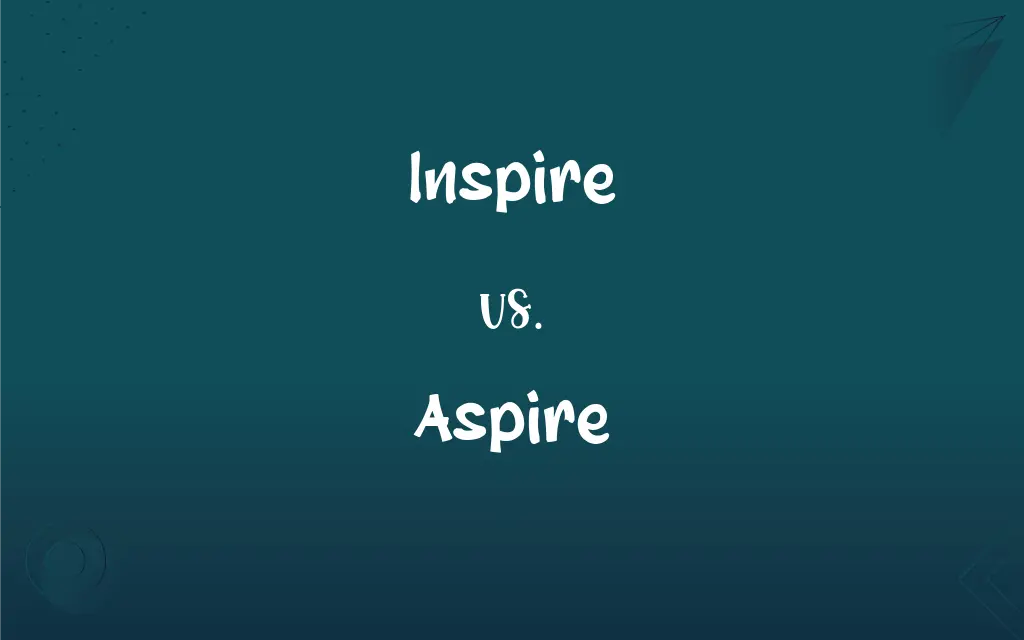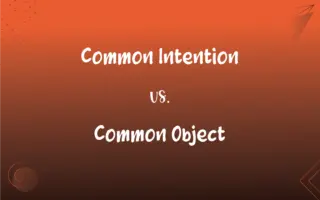Inspire vs. Aspire: What's the Difference?
Edited by Aimie Carlson || By Janet White || Published on November 21, 2023
Inspire refers to fill with the urge or ability to do or feel something. Aspire refers to direct one's hopes or ambitions toward achieving something.

Key Differences
Inspire refers to the act of influencing, moving, or guiding someone emotionally or intellectually, often by being a role model or through creative influence. Aspire, on the other hand, is about an individual's own desires and ambitions, focusing on their personal goals and objectives.
While inspire involves a sense of imparting wisdom, ideas, or motivation to others, often leading to creativity or action, aspire is an inward-directed process where one aims or strives for personal achievements, be it in career, personal development, or specific goals.
Inspire can be seen as a form of impact or influence that one person has on another, often leading to a change in thinking or behavior. In contrast, aspire represents a personal journey of striving for and pursuing specific aims, often driven by inner motivation.
To inspire others is to provide a catalyst for change or creativity, often through example, words, or actions. Aspire, conversely, is about setting personal benchmarks or targets and actively working towards them, guided by individual ambition and drive.
Inspire often involves a transfer of enthusiasm, knowledge, or motivation from one person to another, while aspire is an individual's pursuit of their own ideals and objectives, marked by personal dedication and ambition.
ADVERTISEMENT
Comparison Chart
Direction of Action
Outward - impacting others
Inward - personal goals
Nature of Action
Influencing or motivating others
Striving for personal achievements
Impact
On others' thoughts, feelings, or actions
On one's own life and ambitions
Source
Comes from a person or external stimulus
Comes from within the individual
End Goal
To evoke change or creativity in others
To achieve personal dreams or objectives
ADVERTISEMENT
Inspire and Aspire Definitions
Inspire
To evoke a feeling or action.
Her bravery in adversity inspires others to face challenges courageously.
Aspire
To have a strong desire to achieve something.
He aspires to become a renowned author.
Inspire
To breathe life into ideas or creations.
Great art has the power to inspire new perspectives in its viewers.
Aspire
To dream of accomplishing a specific achievement.
She aspires to travel the world and learn about different cultures.
Inspire
To infuse someone with energy or enthusiasm.
The coach's words inspired the team to play their best game.
Aspire
To aim for a high goal or ambition.
Many athletes aspire to compete in the Olympics.
Inspire
To be the reason someone does something.
She was inspired by her mentor to pursue a career in science.
Aspire
To set one's sights on a particular objective.
He aspires to gain a degree in astrophysics.
Inspire
To fill someone with the urge to do something.
His passionate speech inspired the crowd to take action.
Aspire
To yearn for a future achievement or status.
They aspire to create a more inclusive community.
Inspire
To affect, guide, or arouse by divine influence.
Aspire
To have a great ambition or ultimate goal; desire strongly
Aspired to be a poet.
Inspire
To fill with enlivening or exalting emotion
Hymns that inspire the congregation.
An artist who was inspired by Impressionism.
Aspire
To strive toward an end or condition
Aspiring to great knowledge.
Inspire
To stimulate to action; motivate
A sales force that was inspired by the prospect of a bonus.
Aspire
(Archaic) To rise high; move upwards.
FAQs
What does it mean to inspire someone?
To encourage or stimulate someone to do or feel something positive.
Is aspire a self-directed action?
Yes, it involves personal goals and ambitions.
Does aspire always involve career goals?
No, it can involve any personal ambition, not just career-related.
What are examples of things that can inspire people?
Art, nature, words, actions, and people can all be sources of inspiration.
Can a person inspire themselves?
Typically, inspiration is thought to come from external sources, but self-inspiration is possible through reflection and self-motivation.
Are aspirations always realistic?
Aspirations might not always be realistic, but they often represent ideal goals.
How do aspirations affect behavior?
Aspirations guide choices and actions towards achieving specific goals.
Is inspiration always positive?
Mostly, but sometimes inspiration can stem from negative experiences, leading to positive outcomes.
Can a person inspire themselves to aspire?
Yes, inspiration can lead to the formation of new aspirations.
Can inspiration come from negative experiences?
Yes, overcoming challenges can inspire both the individual involved and others.
Do people always know what inspires them?
Not always; sometimes inspiration is a subconscious process.
How do cultures influence what people aspire to?
Cultural values and norms can shape individual goals and aspirations.
Can inspiration be cultivated?
Yes, by seeking new experiences and perspectives.
Can aspirations change over time?
Yes, as people grow and their situations change, so can their aspirations.
Is there a limit to what one can aspire to?
Theoretically, no, but practical and personal factors can set boundaries.
Can one person inspire a large group of people?
Yes, individuals can inspire masses, such as leaders, artists, or public figures.
Do aspirations require action?
Yes, they typically involve planning and action to achieve.
Can a person's achievements inspire others to aspire?
Yes, achievements can serve as a catalyst for others to set their own aspirations.
Do aspirations need to be specific?
While specificity can help in planning, some aspirations can be broad or evolving.
Is aspiring a passive process?
No, it's an active process involving setting and pursuing goals.
About Author
Written by
Janet WhiteJanet White has been an esteemed writer and blogger for Difference Wiki. Holding a Master's degree in Science and Medical Journalism from the prestigious Boston University, she has consistently demonstrated her expertise and passion for her field. When she's not immersed in her work, Janet relishes her time exercising, delving into a good book, and cherishing moments with friends and family.
Edited by
Aimie CarlsonAimie Carlson, holding a master's degree in English literature, is a fervent English language enthusiast. She lends her writing talents to Difference Wiki, a prominent website that specializes in comparisons, offering readers insightful analyses that both captivate and inform.






































































